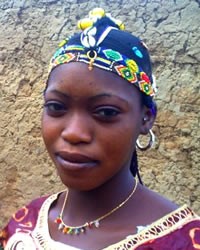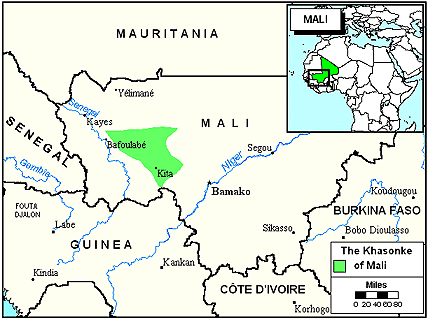The Khasonke are located in the towns of Bafoulabe, Kayes, Kita, and Yelemane in central Mali. They are a sub-group of the Mande and are closely related to the neighboring Bambara and Kagoro. Although the Khasonke speak their own tongue, many also speak the more common Bambara as a second language.
The Bambara are among the most powerful and influential groups in the country. They can be found in the middle valley of the Niger River. Two Bambara kingdoms, Segu and Karta, existed during the eighteenth century. Militant Muslims overthrew these kingdoms in the nineteenth century, but a few Bambara warlords continued resisting until the French arrived forty years later.
The Khasonke are mostly farmers. However, in recent years, sweeping ecological changes in the area, such as drought and overgrazing, have greatly disrupted their agricultural way of life. The staple crop of the Khasonke is millet, but sorghum, groundnuts and fonio (sorghum-like grain) are also produced. Maize, tobacco, manioc and many vegetables are grown in gardens. Farm work is done by both men and women, although the women arrive at the fields later and leave earlier than the men in order to prepare the morning and evening meals. Children between the ages of twelve and fourteen are used to lead the oxen as they plow and to guard them during rest.
The Khasonke also raise animals such as cattle, sheep, goats, horses and chickens. They generally use neighboring Fulani herdsmen to care for their livestock, thus freeing themselves to concentrate on farming during the short rainy season. Hunting is another common activity, and antelope, boar, ostrich and guinea fowl are killed for their meat and skins. In addition honey is gathered from the wild bees in the area.
Khasonke villages consist of a number of different households, usually all from one lineage or extended family. Each gwa (household) provides protection and help in farming for all its members. The members of the gwa work together every day except Monday, which is market day and the traditional day of rest. The houses of the Khasonke are somewhat larger than those of other groups in West Africa, with the largest containing sixty or more people.
Children provide the household's labor force and ensure the future of the lineage. As a result, the average Khasonke woman has eight children. Marriages, therefore, are very important and are viewed almost as an investment. All adults are married, and it is considered strange that some from neighboring groups remain single. Even elderly widows in their seventies or eighties have suitors. The women are obliged to accept one of them, since a wife increases the prestige of a man.
Illiteracy is a major problem of the Khasonke. Some Islamic schools have been established, but most villages fail to educate their children because their help is needed on the farm.
Mali is largely Muslim, with the northern part of the country being the most dominant Muslim region. The majority of the Khasonke are Malikite Muslims. As such, they adhere to the five basic "pillars," or duties, of the Muslim faith. These include affirming that "there is no god but Allah, and Mohammed is his prophet;" daily prayers, almsgiving, fasting during certain periods of time, and making a pilgrimage to Mecca if possible.
The frequent droughts in Mali has caused serious problems for the Khasonke. Also, more schools and an emphasis on literacy are desperately needed. Christian teachers and agriculturists would find many opportunities of ministry in Mali.
Pray that God will raise up strong leaders among the Khasonke believers who will be capable of discipling others.
Ask the Lord to bring forth a vigorous, multiplying Khasonke church.
Pray for the Holy Spirit to give Khasonke people the spiritual hunger it takes to find their way to the cross.
Scripture Prayers for the Khasonke in Mali.
https://en.wikipedia.org/wiki/Khassonk%C3%A9_people
| Profile Source: Joshua Project |











